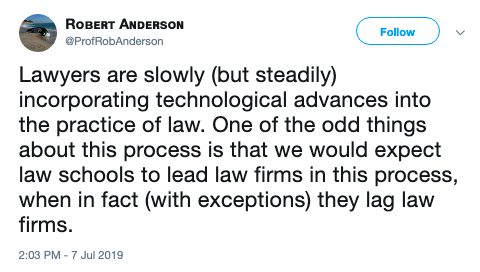As I started to respond to this tweet on Twitter, it occurred to me that this is a perfect #ALTJD topic. And it’s been a while since we’ve posted here. So, I’ll respond here, and tweet about it. A twofer.
I have more questions than answers in response to the tweet.
A few questions that come to mind:
What exactly should law schools be teaching, with regards to technology?
Should law schools be leveraging technology pedagogically, i.e. in how we teach?
How can law schools and practitioners collaborate to connect the dots between legal education and practice through technology?
And, some thoughts occur as I ponder these queries. One is that law schools generally don’t much teach the practice of law, but rather legal theory and how to “think like a lawyer.” These are very different things. This seems relevant to the technology inquiry and what role it should (can?) play in legal education.
Another thought: I’m not sure we have enough qualified people to teach technology courses (once we decide what this should look like in the legal education setting). I’ve talked to folks at many schools who want to integrate technology and innovation courses into the curricula and can’t because there are no faculty to teach the courses. Even finding qualified adjunct is proving challenging.
(I have many thoughts on why this is. Starting with the fact that many people most qualified to teach technology and innovation courses aren’t necessarily biglaw lawyers who can afford to spend an enormous amount of time teaching a course for essentially no remuneration. When this is the model, you get a lot of old, white male adjuncts who generally are very traditional. This severely limits the pool.)
And because this is a microblog I’ll save further thoughts for another day.
-CM

